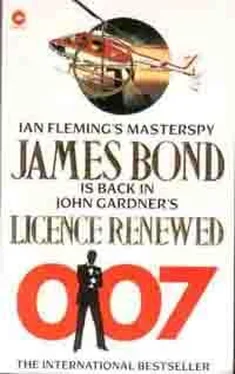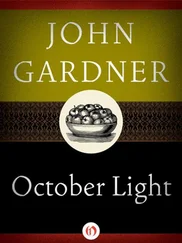'You no longer require my services then?'
She was smiling. Bond had not expected that. 'Well,' he said cautiously. 'If you'd care for dinner...'
'I'd love it,' she grinned.
Bond took her in the Saab. They went into Kensington, to the Trattoo in Abingdon Road, where Carlo was pleased to see his old customer. Bond had not been there for some time and was treated with great respect, ordering for the pair of them — a simple meal: the z.uppa di verdura followed by fegato Bacchus, washed down with a light, young, Bardolino (a '79, for Bardolino should always be drunk young and cool, even though it is red, rather as the French imbibe their rose wines young, Bond explained). Afterwards, Carlo made them plain crepes with lemon and sugar, and they had coffee up in the bar, where Alan Clare was at the small piano.
Ann Reilly was enchanted, saying that she could sit and listen to the liquid ease of Clare's playing for ever. But the restaurant soon started to fill up. A couple of actors came in, a well-known movie director with crinkled grey hair, and a famous zany comedian. For Ann, Alan played one last piece — her request, the sentimental oldie from Casablanca: 'As Time Goes By'.
Bond headed the Saab back towards Chelsea, at Ann Reilly's bidding. Between giving him directions, she laughed a lot, and said she had not enjoyed an evening like this for a long time. Finally they pulled up in front of the Georgian terraced house where Q'ute said she had the whole of the second floor as her apartment.
'Like to come in and see my gadgets?' she asked. Bond could not see the smile in the darkness of the car, but knew it was there.
'Well, that's different,' he chuckled. 'I still stick to the etchings.'
She had the passenger door open. 'Oh, but I have gadgets,' she laughed again. 'I'm a senior executive of Q Branch, remember. I like to take my work home with me.'
Bond locked the doors, followed her up the steps and into the small elevator which had been installed during what estate agents call 'extensive modernisation'.
From the small entrance hall of Q'ute's apartment Bond could see the kitchen and bathroom. She opened the main door and they passed into the remainder of the apartment — one huge room — the walls hung with two large matching gilt-framed mirrors, a genuine Hockney and an equally genuine Bratby, of a well-known composer whose musicals had been at their peak fifteen to twenty years ago. The furnishings were mainly late 1960s Biba, and the lighting was to match — Swedish in design, and mounted on battens angled into the corners of the room.
'Ah, period decor,' said Bond with a grin.
Ann Reilly smiled back. 'All is not as it seems,' she giggled, and for a moment Bond wondered if she was not used to drinking: perhaps the wine had gone to her head. Then he saw her hand move to a small console of buttons by the light switches. Her fingers stabbed at the buttons, and in the next few seconds Bond could only think of transformation scenes at childhood pantomimes.
The lights dimmed and the room became bathed in a soft red glow which came from the skirting boards. The large, circular, smoked glass table which formed a focal point at the centre of the room seemed to sink into the carpet, and from it there came the sound of splashing water as it gleamed with light to become a small pond with a fountain playing at its centre. The Hockney, Bratby, and both of the mirrors appeared to cloud over, then clear, changed into paintings of a nature that almost shocked Bond by their explicitness.
He sniffed the air: a musky scent had risen around him, while the sound of piano music gently rose in volume — a slow, sensual blues solo, so close and natural that Bond peered about him, thinking the girl was actually sitting at an instrument somewhere. The scent and music began to claw at his senses. Then he took a step back, his eyes moving to the wall on his right. The wall had started to open up, and, from behind it, a large, high, waterbed slid soundlessly into the room — above it a mirrored canopy hanging from crimson silk ropes.
Ann Reilly had disappeared. For a second, Bond was disorientated, his back to the wall, head and eyes moving over the extraordinary sight. Then he saw her, behind the fountain, a small light, dim but growing to illuminate her as she stood naked but for a thin, translucent nightdress; her hair undone and falling to her waist — hair and the thin material moving and blowing as though caught in a silent zephyr.
Then, as suddenly as it all happened, the room started to change again. The lighting returned to normal, the table rose from the fountain, the Hockney, Bratby, and mirrors were there once more, and Q'ute slowly faded from view. Only the bed stayed in place.
There was a chuckle from behind him, and Bond turned to find Q'ute, still in her brown velvet, and with her hair smooth and pleated, as she leaned against the wall laughing. 'You like it?' she asked.
Bond frowned. 'But?..'
'Oh come on, James. The transformation's easy: micro and electronics; son et lumiere. I built it all myself.'
'But you?..'
'Yes,' she frowned, 'that's the most expensive bit, but I put most of that together as well; and the model is me. Hologram. Very effective, yes? Complete 3D. Come on, I'll show you the gubbins...'
She was about to move away when Bond caught hold of her, pulled her close and into a wild kiss. She slid her hands to his shoulders, gently pushing him away. 'Let's see.' She cocked an eyebrow at him. 'I thought you'd have got the idea. You said the place was period decor — 1960s. All I've done — and I've spent many happy hours getting it right is add in a 1960s' fantasy: music, lights, the waterbed, scent, and an available bird with very few clothes on. I thought you of all people, James Bond, would have got the message. Fantasies should change with the times. Surely we're all more realistic these days. Particularly about relationships. The word is, I think, maturity.'
Yes, thought Bond, Q'ute was a good name for Ann Reilly, as she scurried around showing off the electronics of her fantasy room. 'It might be an illusion', he said, 'but it still has a lethal effect.'
She turned towards him, 'Well, James, the bed's still there. It usually is. Have some coffee and let's get to know one another.'
* * *
In his own flat the next morning, Bond was awake before six-thirty. The biter bit, he thought, with a wry smile. If ever a man's bluff had been called, it was by the ingenious Q'ute. In good humour he exercised, took a hot bath, followed by a cold shower; shaved, dressed and was in his dining room when the faithful May came in with his copy of The Times and his normal breakfast — the favourite meal: two large cups of black coffee, from De Bry, without sugar; a single 'perfectly boiled' brown egg (Bond still affected to dislike anything but brown eggs, and kept his opinion regarding three and one-third minutes constituting the perfect boiling time); then two slices of wholewheat toast with Jersey butter and Tiptree 'Little Scarlet' strawberry jam, Cooper's Vintage Oxford Marmalade or Norwegian heather honey.
Governments could come and go; crises could erupt; inflation may spiral, but — when in London — Bond's breakfast routine rarely changed. In this he was the worst thing a man in his profession could be: a man of habit, who enjoyed the day starting in one particular manner, eating from the dark blue egg cup with a gold ring around the top, which matched the rest of his Minton china, and happy to see the Queen Anne silver coffee pot and accessories on his table. Faddish as this quirk certainly was, Bond would have been outraged if anyone told him it smacked of snobbery. For James Bond, snobbery was for others, in all walks of life. A man has a right to certain pleasurable idiosyncrasies — more than a right, if they settled his mind and stomach for the day ahead.
Читать дальше











